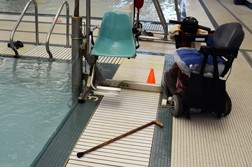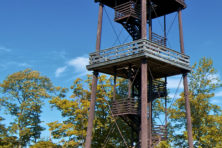ADA Requirements Pose Pool Challenges
- Share
- Tweet
- Pin
- Share

The pools at the Door County YMCA have had lifts since they were built, but other pools in the county, including those at hotels and campgrounds, will need to install lifts by Jan. 31, 2013 to comply with requirements in the 2010 Americans with Disabilities Act. Photo by Katie Sikora.
A deadline looms for hotels, campgrounds and other places with swimming pools to comply with requirements from the 2010 American Disabilities Act (ADA).
But until it hits, many will wait to hear from industry lobbyists trying to change the rule.
“I’ll wait until the very last minute, I guess,” said Tammy Bork, owner of the Beachfront Inn in Baileys Harbor.
On Jan. 31, 2013, hotels, campgrounds and other places with swimming pools will be required to install a permanent lift to the side of every pool and hot tub, according to the 2010 ADA requirement.
The lifts will help disabled swimmers get in and out of pools, making facilities more accessible.
That January deadline has already been pushed back from the original one of March 15, 2012, but the nation’s lodging industry, as well as local hotels and campgrounds, are still resisting. They say the rule doesn’t give enough leeway for small businesses that can’t afford lifts and should allow them to use portable lifts instead.
“Our industry definitely wants to welcome and encourage overnight lodging by persons with disabilities, but we are concerned with the logistics of accomplishing that goal and providing that access,” said Trisha Pugal, president of the Wisconsin Hotel and Lodging Association.
There is some freedom for small businesses and public pools. The ADA requires facilities to make accessibility changes – like installing ramps, electric doors and pool lifts – when the changes are “readily achievable.”
If businesses can’t afford to comply right away, they can wait until they’ve saved up the cash.
“There’s no ADA police going and sneaking into hotels to see if they’ve installed pool lifts,” said Peter Berg, project coordinator of technical assistance at the Great Lakes ADA Center.
If disabled persons feel they’re discriminated against and not given equal access to facilities, they can file complaints with the Department of Justice (DOJ) or private lawsuits.
That’s something Byia Martin, a facilitator for Routes for Change and the Disability Action Access Network, has dealt with before. Martin is quadriplegic and said accessibility issues are very common. Usually just telling a business or group about a problem is enough, but he’s had to file complaints with the DOJ in the past.
“A hotel or business can’t really argue against [the ADA],” Martin said. “If it’s not an undue burden or a safety issue, I can’t see any reason why they can’t accommodate.”
Martin was recently at a hotel in Wisconsin Dells that had a pool lift. He didn’t use it though – he doesn’t like the water.
In his experience, pool lifts at hotels are rare. That rarity may play a role in the experience of some pool owners, like Bork. She’s never had a disabled customer ask if a pool lift is available.
But there may be a reason few people ask for the lifts, even though the 2010 U.S. Census reported 18.7 percent of Americans are disabled in some way.
“There’s no reason for anyone to ask for something they know isn’t going to be there,” said Shane Beegle, manager of Harbour Village campground and water park in Carlsville.
Beegle’s a Marine Corps veteran and knows a lot of veterans come home disabled. Still, he’d prefer to put in portable lifts at some locations at the water park.
In one area, a pool and hot tub are just about 20 feet away from each other and under the ADA requirements he’ll need a lift for each one.
Although she understands the importance of providing a lift, Bork also wishes she could settle for a portable one. That way she could push it aside until someone needs it. She’s concerned that kids would play on a permanent lift and hurt themselves, which could result in an expensive lawsuit.
That’s also a concern for Pugal, who said that while lifts may provide access to the water for some guests, they pose a safety threat to many. A lot of pools at hotels and campgrounds don’t have lifeguards, and if children play on the lifts, they could get hurt.
“Our thought is that this is not a safe environment when that structure is left at all times, whether supervised or not,” Pugal said.
Although safety hazards can be legitimate concerns to facilities putting in pool lifts or removing other barriers that limit accessibility, Berg said the dangers have to be real, not hypothetical.
“You have other types of furniture in the pool area, too,” Berg said. “If operating a pool is such a safety hazard, why doesn’t the hotel have a lifeguard on duty?”
The Door County YMCA pools have had lifts since they were built, and aquatics director Mary Heimann said they’ve never caused a problem with safety. The lifts are in lanes designated for swimming laps, so kids are rarely in that area of the pool.
The lifts also don’t require much maintenance, just a weekly polish to keep the stainless steel from rusting.
Heimann said the YMCA pools serve a different purpose than most hotel pools. YMCA lifts are used often by regular visitors, while hotel guests are rarely regular swimmers.
“We have a history of working with the hospital, so we have therapists coming in and working with people who are disabled in our pools,” Heimann said.
Although they tend to be preferred by the lodging industry, portable lifts aren’t allowed under the ADA requirements because it means disabled swimmers would have to ask for lifts to be set up.
“They can’t require someone with a disability needing a pool lift to have to call down to the front desk and wait for someone to put in the pool lift,” Berg said. “It’s not equal access or providing the same opportunity for a person with a disability.”
But the cost of installing permanent lifts is a problem for owners of small lodging facilities, like Bork. She’s running a small seasonal operation and can’t easily absorb the cost of a lift like bigger hotel chains.
Permanent lifts usually cost between $6,000 and $8,000, plus the cost of installation. Portable lifts are slightly cheaper and start as low as $2,000.
“Now I have to come up with another $10,000 for something that’s not going to be used,” Bork said. “I’d rather spend that money on something else, like a parking lot, or remodeling a room for somebody [with disabilities]. I could remodel a bathroom for that cost.”
Bork renovated the pool at the Beachfront Inn last year, but with the pool lift requirements and the renovation she had to do for the Virginia Graeme Baker Pool & Spa Safety Act – which required pools to have anti-entrapment drain covers and other safety features – she wishes she hadn’t.
“We regret building a new pool,” Bork said. “It looks nice from the road, but with this type of stuff coming through, financially it was just a burden we shouldn’t have taken on… Maybe we’ll close the pool down, I don’t know.”


